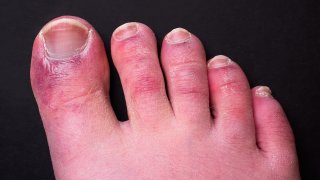
A new analysis shows that "long-hauler" COVID-19 patients may experience prolonged skin symptoms, with one patient reporting having "COVID toes" for nearly six months.
The analysis was conducted on patients listed on the International COVID-19 Dermatology Registry, the world's largest registry of coronavirus patients with dermatological symptoms. Nearly 1,000 cases are registered from patients in 39 countries.
While most dermatological symptoms lasted an average of 12 days, some patients reported longer durations.
"When we started looking at symptom duration, some of these patients are having really incredibly long-lasting symptoms," said Dr. Esther Freeman, the principal investigator of the registry and the director of Global Health Dermatology at Massachusetts General Hospital in Boston. "In particular, we saw that with chilblains, also known as COVID toes, where they've been having skin symptoms for more than 60 days."
Two patients had much longer times: One patient had COVID toes for over 130 days, and another had them for more than 150 days.
"They've had toe swelling and toe discoloration and toe pain for many months," Freeman said. "They've had this really kind of persistent inflammation." Currently, there are no guidelines for treatment to address COVID toes and doctors are evaluating options. Freeman recommends keeping the body and toes warm.
Other skin symptoms include hives, which lasted for about five days in most cases, and scaly papule and plaques, called "papulosquamous eruptions," lasting around 20 days. Different symptoms may indicate the severity of COVID-19 infections: Freeman said that only about 16% of patients with COVID toes were hospitalized, while 100% of patients with a condition known as retiform purpura (a rapidly spreading red or purple rash, displayed in a netlike pattern) were hospitalized.
Coronavirus Pandemic
Full coverage of the COVID-19 outbreak and how it impacts you
Freeman said that while the registry primarily tracked dermatological symptoms, they did also keep track of other symptoms that people with confirmed coronavirus cases were experiencing. Some with long-lasting skin symptoms also reported other symptoms, like coughs and persistent fatigue. Outside of the registry, there have been a myriad of long-hauler symptoms attributed to COVID-19 including heart damage, lung scarring, kidney abnormalities, hair loss, mental health issues, insomnia and neurological symptoms.
The analysis, which will be discussed at the 29th European Academy of Dermatology and Venereology Congress, may have implications for understanding other prolonged symptoms in COVID-19 long-haulers, Freeman said.
"This data adds to our knowledge about how COVID-19 can affect multiple different organ systems, even after patients have recovered from their acute infection," said Freeman in a press release. "The skin can provide a visual window into inflammation that may be going on elsewhere in the body."
While some of the long-lasting symptoms may sound frightening, Freeman emphasized that it was only in a small number of patients and does not seem to lead to any significant health risk.
"(COVID toes) go away relatively quickly, and they go away on their own, and they don't seem to have a lot of long-lasting effect," she said. "I don't want people to panic. I think it's important to be reassured that this is generally associated with pretty mild disease ... It's just important to recognize that there is a subgroup of patients that seemed to have these really long-lasting persistent symptoms and that's a group we need to further understand."
This story first appeared on TODAY.com. More from TODAY:


